Man charged during vaccine mandates protest in downtown Toronto as road closures remain

A major intersection in downtown Toronto was blocked by trucks as part of a demonstration on Saturday against COVID-19 measures and vaccine mandates, but nearly all the vehicles had left the area by 8 p.m. ET.
Amid heavy police presence, trucks were parked in the middle of Bloor Street West and Avenue Road, an intersection just north of the University of Toronto and the Royal Ontario Museum.
Late Saturday, interim police Chief James Ramer said on Twitter that the protesters had been removed.
Meanwhile, road closures put in place by police before the protest began will remain through the night, Toronto police said. Supt. Lauren Pogue said they'll continue to assess the situation and will reopen the roads when it's safe.
"We will still maintain the hospital corridor because that is definitely a priority for us to ensure access to medical assistance there and for the workers to have unimpeded access," Pogue told CBC News.
"We will maintain University right now, and I think all road closures will remain in place until we assess and make a decision to open things up.
"We are not allowing anyone to stay overnight, so we will have our resources in place to ensure that everyone leaves the city safely, and again, we will open everything up once we feel that it's safe to do so," Pogue added.
Man arrested on north side of Queen's Park
Toronto police arrested a 22-year-old man on the north side of Queen's Park, near the Ontario Legislature. He's charged with assault with a weapon, administering a noxious substance — a smoke bomb — and public mischief.
Police also said an ambulance operated by Peel Region was slowed down at the intersection because of trucks and protesters.
"Vehicles and people must make room for emergency vehicles to pass through," police said in a tweet. "This is unacceptable and will not be tolerated. There are traffic delays across the city due to protests."
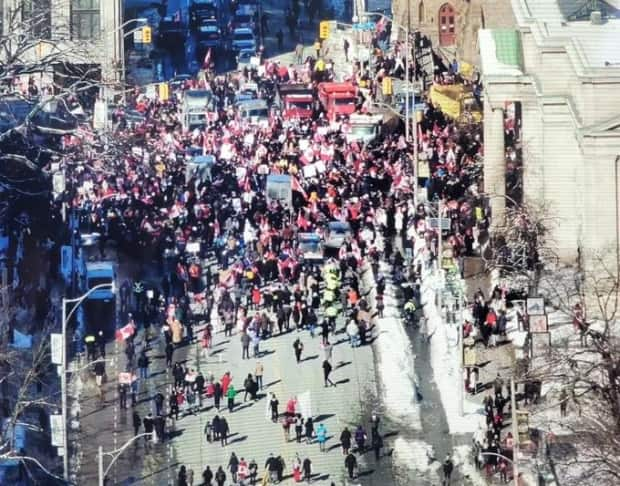
Shortly after midday, large crowds gathered a couple of blocks away on the north lawn of Queen's Park, which is located at the back of the provincial legislature building.
Flyers advertising a "convoy for freedom" against COVID-19 measures have circulated on social media.
Michael Yhip, one of the protesters, said that as a member of a visible minority, he is supporting the demonstration to make a statement.
"This isn't a racist protest, and people should start to listen to what they're talking about," Yhip said
"It's somewhat selfish for people to try to demand other people wear masks or take medication to keep them safe."
Yhip said he's not opposed to vaccination, and he has received two COVID-19 shots, but he said people are "owed an honest conversation about this."
Police said they did not have an estimate of the crowd at the demonstration on Saturday afternoon.
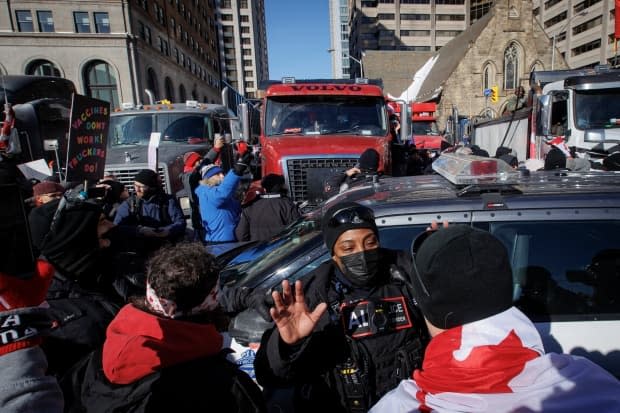
Counter-protest supports health-care workers
A counter-protest in support of hospital workers was also held in the area of University Avenue and Gerrard Street West, in front of Toronto General Hospital.
Linda Jacobsen, one of the counter-protesters, told CBC News that she felt it was important to gather in front of the hospital and maintain a physical presence to make a statement about messages from the demonstration.
"Well, this expression has just been running through my mind, you know, 'For evil to triumph, It's enough that good people do nothing.' I feel like this is just a time to stand up and be counted and be visible against this kind of threat to our democracy," Jacobsen said.
"I'm Jewish. I grew up learning about the Holocaust. I'm very concerned about far right-wing elements gaining ground in this country. And not just that, I'm a veterinarian, I believe in science, I believe in vaccination, and I'm really concerned about the threat to our health-care system and just the fabric of our society that this kind of attitude represents."
WATCH | Counter-protesters support hospital workers in Toronto:
Dr. Andrew Boozary, executive director of social medicine at the University Health Network, said the counter-protest was important to "lift up our health-care system, to support our health workers and all the patients and families that are accessing care right now."
"There's been so much sacrifice. Everyone who's been here has sacrificed so much, and I think we're just really about spreading that gratitude and wanting to be sure that we're going to stand up for our health system and stand up for each other and patients and families," he told CBC News.
Boozary said he understands that everyone, including those in the health-care system, are exhausted and tired with the restrictions. But he said that "when you see some of the mobilization around hatred, you know, Islamophobia, antisemitism and the view that, you know, health-care workers may not be safe, that's something we have to push back against."
Earlier on Saturday, protesters gathered in spots across Toronto, including at Yorkdale Shopping Centre near Highway 401, where a few trucks and dozens of vehicles stayed in the corner of a parking lot, with Canadian flags waving and horns honking.
WATCH | Protesters gather in mall parking lot:
Toronto officials were hoping to avoid the kind of blockade that's been happening over the past week in Ottawa, where demonstrators in trucks have occupied key areas of the downtown.
Ramer said his force is looking to Ottawa and relying on "intelligence" from other police forces in forming its plans.
"Given the information that we've received, we feel these steps are appropriate," Ramer told a Friday news conference.
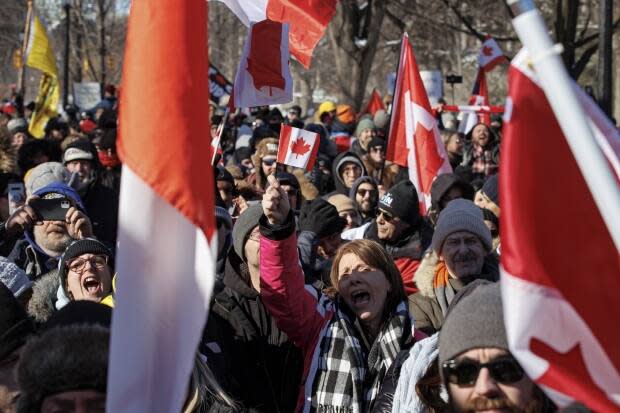
The police service has also sent extra officers to the core in an effort to keep the peace.
"It's very much a fluid and very dynamic situation," Ramer said. "It requires us to be nimble and agile and have to adapt. I can't speak to specific strategies, nor will I, frankly, it's just simply to know that we are examining a number of contingencies.... We will do our very best to address public safety."
Vehicles were not being allowed at Queen's Park.
Several roads closed downtown to protect hospitals
Police closed many roads in the downtown core to most traffic to protect the area known as Hospital Row.
Roads closed include:
University Avenue between College Street and Queen Street West.
The southbound Don Valley Parkway at Richmond Street, which heads into the downtown core.
The eastbound Gardiner Expressway at Lake Shore Boulevard.
The following closures were also in place:
Avenue Road from Bloor Street West to Davenport Road.
Dundas Street West from Spadina Avenue to Yonge Street.
College Street from University Avenue to Yonge Street.
Queen's Park Crescent from College Street to Bloor Street West.
Queen Street West from Yonge Street to University Avenue.
Bay Street from Bloor Street West to Queen Street West.
Parking restrictions were also in place on a number of surrounding streets.
Police were asking the public to avoid these areas and use public transit if they must travel to the area.
However, hospital staff, workers, patients, their families and those picking up patients were being given access, police said.
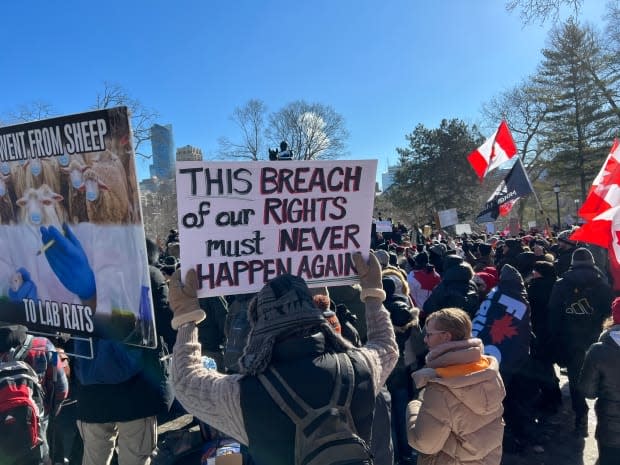
Police install additional CCTV cameras downtown
On Friday, police said there would be greater police presence in and around the downtown core and other parts of the city, but wouldn't give specifics of where they'd be located or how many officers were being assigned.
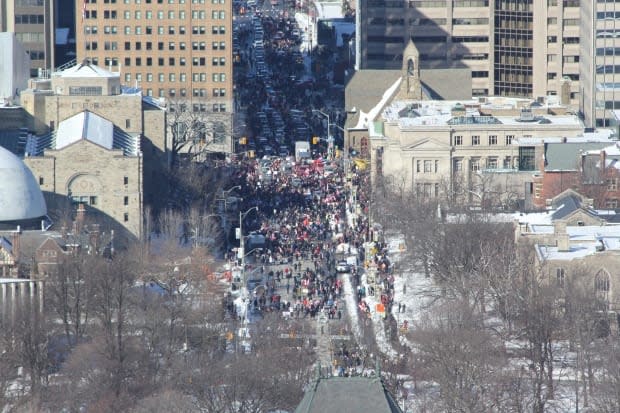
Pogue told reporters police installed additional CCTV cameras and that officers have been instructed to have their body-worn cameras turned on.
Police said the road closures put in place Friday could remain all weekend and that the situation is a fluid one.
"We will continue to assess the situation and make any adjustments where needed. We will continue to update the public," they said in a tweet.


